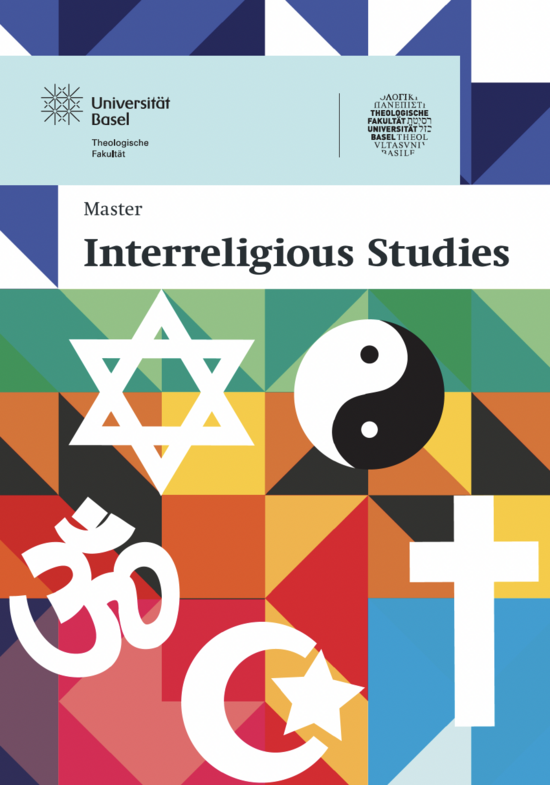Master's Program Interreligious Studies
The international Master's program «Interreligious Studies» addresses a highly topical matter: religious plurality. It is a degree the Theological faculty of Basel offers with its partner universities, Strasbourg (F) and Heidelberg (D), in cooperation with the «Hochschule für Jüdische Studien» in Heidelberg (D). Students face religious plurality as a European phenomenon, taking classes in Christian, Jewish, Islamic theology, as well as Religious Studies, in Switzerland, France, and Germany.
Religious plurality is one of our society's characteristics. This is also reflected in our universities, where one can study theology and spirituality from the perspective of various religions. Religious plurality can be experienced as cultural enrichment, yet conflict and tensions, theological as well as political, remain an issue wherever religious beliefs clash. Even though religious diversity has grown in Europe over the last centuries, heightened social mobility and the realities of migration have supported religious plurality in recent decades. Because of these developments, the need to learn about other religions and discover new strategies for interreligious interaction has increased significantly.
For any questions about the degree, please contact Dr. Delphine Conzelmann (delphine.conzelmann@unibas.ch).
The Master's program in Interreligious Studies comprises 120 ECTS Credit Points and is a single course of study that does not encompass other subject matter. Students in the program must complete at least 30 Credit Points at the partner institutions (University of Strasbourg, University of Heidelberg, Institute for Jewish Studies in Heidelberg) as well as at least 30 Credit Points at the University of Basel, in addition to completing the Master's thesis at the University of Basel. One ECTS Credit Point corresponds to 30 hours of work.
For the course of study, click here.
Admission
Since the program deals with connections between different areas of study, it is open to students with a wide range of academic backgrounds. It is aimed at individuals with a Bachelor's degree in Theology or another field in the Humanities and who would like to focus more in-depth on interreligious questions.
For information on admission to the University of Basel, visit this page.
Applicants holding a Bachelor's degree from the University of Basel do not need to provide additional documentation.
The applicant:
- has or is completing a degree in one of the following fields: Art History, Classics, Cultural Anthropology, Eastern European Studies, English, Ethnology, French, Gender Studies, German, History, Italian, Jewish Studies, Law, Media Studies, Music, Near Eastern Studies, Nordic languages, Philosophy, Politics, Religious Studies, Sociology, Spanish, Theology.
- can demonstrate having studied in one of the above fields at an institution recognized by the University of Basel
- can demonstrate having studied in one of the following fields in a program that is comparable in rigor to the Bachelor's programs in these fields at the University of Basel: African Studies, Ancient Near Eastern Studies, South Asian Studies, Central Asian Studies, East Asian Studies, Philosophy of Science, History of Science.
After the application is submitted, it will be reviewed by the admission committee. If the applicant's Bachelor's degree does not fulfill the admission requirements (or only does so in part), conditional admission (up to a maximum of 60 Credit Points) may be offered. The Dean's office will communicate the admissions decision to the applicant in writing.
Applying
Apply here. The application fee is CHF 100. The application deadline for the fall semester is April 30, and for the spring semester, it is November 30.
Matriculation
Information on matriculation will be provided with the notification of acceptance. Students holding a Swiss Bachelor's degree generally do not need to appear in person to matriculate.
Tuition
Tuition per Semester (also during the examination semester): CHF 850. Room and board are the responsibility of the student.
Stipends and student loans: Applications should be submitted to the financial aid office of the canton in which the student's parents have legal residence.
In light of the growing societal interest in religious literacy and interreligious competencies – particularly in the era of global migration as well as religious radicalization –, it is expected that there will be an increasing demand in different professional sectors for specialists in interreligious issues. The skills acquired in the MA program in Interreligious Studies are relevant in a variety of different fields such as in the Church, social work, the press, politics, NGOs, and education.
- Basel is located geographically at the juncture of Switzerland, France, and Germany and as such has a very international outlook. The open and welcoming city also offers many cultural attractions for students, including museums, theater, and the famous "Basler Fasnacht" (carnival).
- For students coming from abroad, the cost of living in Basel is somewhat lower compared to other parts of Switzerland. The University is centrally located, and navigating Basel on foot and by bike is very easy.
- Students in Basel have several options for affordable housing. As an alternative to renting a private apartment, students can also rent a room in a dormitory, and here it is advised to apply well in advance. Several dormitories offer shared cooking and living spaces, thus allowing students to meet each other and to feel at home in Basel more quickly. Different housing options are listed here: Student-Life.
Quick Links
Social Media

